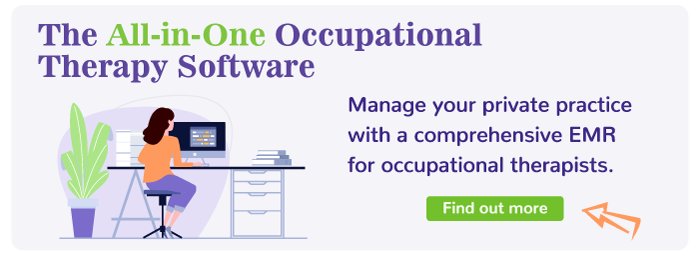CPT code 97530

CPT code 97530 and other CPT codes and their billing requirements are updated annually, you may be wondering what’s new. CPT code 97530 is Therapeutic Activity, the use of a skilled activity in therapy to improve a patient’s overall health or functional capacity. These are whole-body rehabilitative procedures that utilize performance skills such as reaching, standing, dynamic postures, bending, lifting, or carrying. These activities may also incorporate cognitive elements to simulate real-world scenarios before practicing tasks during an ADL, IADL, home, or work routine.
→ Click here to enroll in our free on-demand Insurance Billing for Therapists video course [Enroll Now]
Occupational therapists use therapeutic activities for patients to address multi-factor demands and skills that influence a person’s functional performance level, requiring customized treatment interventions. This article will cover general considerations and requirements for billing this code in your practice.

What is CPT Code 97530?
The American Medical Association (AMA) defines CPT code 97530 as Therapeutic Activities with direct, one-on-one contact with the patient using dynamic activities to improve functional performance, every 15 minutes. This code is timed and may have restrictions or modifiers required for reimbursement depending on the payor.
Types of procedures covered under this code involve activities that combine multiple skills to simulate real-world functional activities. They are considered medically necessary in cases that require multiple rehabilitative techniques or to simulate a specific skill unique to a patient and their treatment goals.
An example would be setting up an activity where patient practices stabilizing themself at a counter while reaching for items to simulate cooking in their home environment. The medical necessity lies within the treatment goals requiring clinical skills as a therapist must assess and grade the activity to ensure the progression of skills to meet goals.
Medical necessity and coverage criteria required by the Centers for Medicare and Medicaid Services (CMS) include required documentation of therapeutic activities to demonstrate a clear link between specific activities performed and how skills are related to goals in the treatment plan.
CPT Code 97530 and occupational therapy
Occupational therapy services covered by CPT code 97530 include dynamic activities designed by the therapist that target specific skills to enhance a patient’s functional performance. These include various activities designed to simulate real-world demands to prepare a patient for participation such as fine motor coordination activities, standing tasks to reach for items, or simulating a shopping task using the computer. These activities tap into skills addressed in therapy to prepare the patient for achieving and performing treatment goals.
Regarding treatment modalities, they are billed per device versus activity, so only the time required for actual functional activity duration will count towards your units for this code. Occupational therapists are skilled in performance-based activities and using task analysis that naturally complement use of therapeutic activities in a treatment plan. Therapeutic activities also allow a therapist to create individualized interventions to bolster progress unique to each patient.
Watch this video to learn common insurance billing struggles and solutions
→ Start My Free Trial
→ Start My Free Trial
Maximizing reimbursement for CPT Code 97530
Common reimbursement issues include incorrect units billed, unauthorized provider billing for code (charges billed by professionals other than a licensed physical, speech, or occupational therapist), incorrect use of modifiers, and if billed with a restricted service in the same session. Depending on who and how you submit your claim, a modifier may be required to identify who provided the service.
Modifiers GP for physical therapists, GO for occupational therapists, and GN for speech-language pathologists may be required for insurance companies to identify who provided the service for accurate reimbursement.
Modifier 59 helps distinguish between two or more services provided during the same session, to report that both services were medically necessary. Refer to your respective insurance provider manuals for guidance on when to use these modifiers. For current restrictions when using this code, as of January 2020, CPT code 97530 cannot be billed with a group procedure (CPT 97150) or on the same day as a Physical Therapy or Occupational Therapy Evaluation.
Another restriction is that two therapists cannot charge for CPT code 97530 for the same session. An example would be if OT and PT worked on a therapeutic activity together for standing and reaching, only one therapist can charge for the use of therapeutic activity.
CMS provides a public billing and coding resource that states clear documentation is required to support the need for the continued skilled therapeutic activity intervention beyond 10-12 visits.
Additional key documentation elements include supportive documentation required every 10 visits when using CPT code 97530 to include loss of function for ADL skills, coordination, strength, balance, range of motion, and mobility in addition to how limited skills relate to the loss of functional performance.
A description of the specific therapeutic activity performed, the type of assistance required, and the amount of assistance required need to be documented to illustrate the need for skilled clinical expertise provided by the licensed therapist.
CPT Code 97530 and compliance
CPT code 97530 is time-based, meaning this code follows the 8-minute rule, requiring at least 8 continuous minutes of direct face-to-face time spent during the activity. This billable time can only count with one patient at a time and cannot be billed with a group session or concurrent session for the same time.
Additional compliance regulations include that a licensed occupational therapist, speech therapist, or physical therapist needs to supervise when an assistant or student is performing therapeutic activities. This is because constant assessment and grading of activity generally occur during therapeutic activities to progress performance, requiring clinical judgment provided by a supervising therapist. Potential compliance risks include if a therapy assistant changes the activity without having documentation of supervision or collaboration by supervising therapist.
Strategies for ensuring compliance boil down to having direct, clear, and efficient documentation reporting a clear link to how the therapeutic activity prescribed will improve specific skills for functional performance and meet goals listed on the patient’s treatment plan.
In summary, CPT code 97530 is a timed code used for billing therapeutic activities requiring direct one-on-one skilled attention from a licensed and qualified therapist. Review CMS billing guidelines, your insurance payor coverage determinations, and quarterly updates to Medicare National Correct Coding Initiative (NCCI) Edits, available on the https://CMS.gov website, for current updates to rules for billing CPT code 97530.
Therapeutic activities have a significant place in occupational therapy treatment plans as we specialize in participation and performance-based treatments. Occupational therapists combine various skills with activity demands to simulate authentic participation in daily tasks.
Start 30-day Free Trial and explore TheraPlatform. HIPAA Compliant Video and Practice Management Software for Therapists.
How EHR and practice management software can save occupational therapists time with insurance billing
EHR with integrated billing software and a clearing house, such as TheraPlatform, offers occupational therapists significant advantages in creating an efficient insurance billing process. The key is minimizing the amount of time dedicated to developing, sending, and tracking medical claims through features such as automation and batching.
What are automation and batching?
- Automation refers to setting up software to perform tasks with limited human interaction.
- Batching or performing administrative tasks in blocks of time at once allows you to perform a task from a single entry point with less clicking.
Which billing and medical claim tasks can be automated and batched through billing software?
- Invoices: Create multiple invoices for multiple clients with a click or two of a button or set up auto-invoice creation, and the software will automatically create invoices for you at the preferred time. You can even have the system automatically send invoices to your clients.
- Credit card processing: Charge multiple clients with a click of a button or set up auto credit card billing, and the billing software will automatically charge the card (easier than swiping!)
- Email payment reminders: Never manually send another reminder email for payment again, or skip this altogether by enabling auto credit card charges.
- Automated claim creation and submission: Batch multiple claims with one button click or turn auto claim creation and submission on.
- Live claim validation: The system reviews each claim to catch any human errors before submission, saving you time and reducing rejected claims.
- Automated payment posting: Streamline posting procedures for paid medical claims with ERA. When insurance offers ERA, all their payments will post automatically on TheraPlatform's EHR.
- Tracking: Track payment and profits, including aging invoices, overdue invoices, transactions, billed services, service providers
Utilizing billing software integrated with an EHR and practice management software can make storing and sharing billing and insurance easy and save OTs time when it comes to insurance billing for therapists.
Resources
TheraPlatform is an all-in-one EHR, practice management, and teletherapy software built for therapists to help them save time on admin tasks. It offers a 30-day risk-free trial with no credit card required and supports different industries and sizes of practices, including occupational therapists in group and solo practices.

More resources
- Therapy resources and worksheets
- Therapy private practice courses
- Ultimate teletherapy ebook
- The Ultimate Insurance Billing Guide for Therapists
- The Ultimate Guide to Starting a Private Therapy Practice
- Insurance billing 101
- Practice management tools



